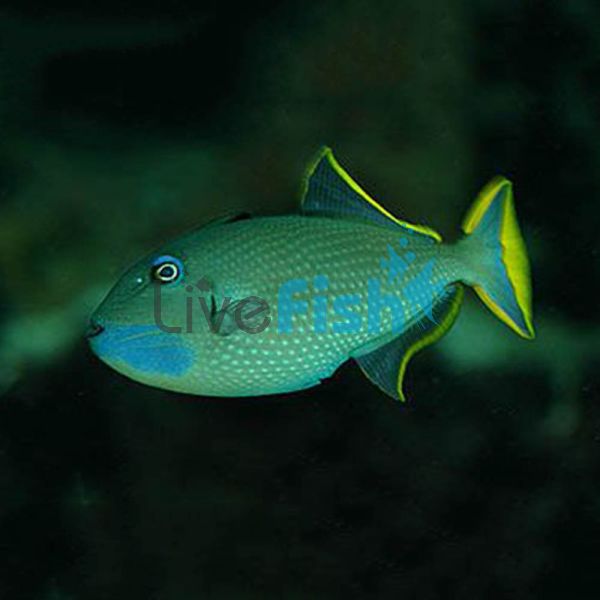Male Blue Jaw Triggerfish - Medium
The male and female Blue Jaw Triggerfish differ in appearance. They are both a greyish color but males are blue around their cheeks and throat with yellow trim on their fins. Females don't have a blue throat. Instead, like the male, they have a striking blue ring around their eye and white spots on their body. These are tough fish with armor-like scales over their body, and a mouth capable of crushing shells. Their dorsal spine can be raised and locked when it is resting in a hole or currents and waves are strong. This prevents it from being removed.
Triggerfish Blue Jaw Male
The male and female Blue Jaw Triggerfish differ in appearance. They are both a greyish colour but males are blue around their cheeks and throat with yellow trim on their fins. Females don't have a blue throat. Instead, like the male, they have a striking blue ring around their eye and white spots on their body. These are tough fish with armour-like scales over their body, and a mouth capable of crushing shells. Their dorsal spine can be raised and locked when it is resting in a hole or currents and waves are strong. This prevents it from being removed.
The sexes can be identified by checking for the blue throat and cheeks on the male of the species. Females also have a duller body colour. They build a nest when breeding with the male guarding the eggs until hatching. Information about home aquarium breeding is limited.
Blue Jaw Triggerfish are found in the Indo-Pacific region. Locations include East Africa, Hawaii, New Caledonia, and Ryuku. In the wild, they inhabit reefs containing plenty of coral, to depths of 20 metres.
Tank Recommendations for the Blue Jawed Triggerfish
Blue Jaw Triggerfish need a tank capacity of at least 125 gallons (473 litres).
They can be introduced to a reef environment, but caution is advised. Blue Jaw Triggers won't nip on corals, but they may nip small invertebrates. A secure lid is a good idea as this species can jump when startled.
A suitable tank should have plenty of rockwork with caves for them the rest in. They will rearrange rocks and ornaments in an aquarium. There should also be a large area of open space to allow them to swim freely.
Suitable Tank Buddies
The Blue Jawed Triggerfish is semi-aggressive, but it is considered to be one of the least aggressive Triggerfish. It is still advisable to only keep one male in a tank to prevent aggression.
It is possible for this species to co-habit as a mated pair or in a small group consisting of a male and two or more females.
Usually Compatible
Blue Jawed Triggers need to be housed with similarly sized species. Any tank buddies should have a temperament that can handle potential aggression. A general rule for triggerfish is to introduce them as the last fish into an aquarium to reduce this.
Sometime Compatible
Caution is advised for most other fish when co-habiting with Triggerfish. Conspecifics, Angelfish, Pufferfish, Tangs, and Wrasses are examples of fish that need monitoring.
Rarely Compatible
Small reef fish are unsuitable as this species may annoy them. Slow movers such as Seahorses and Pipefish may also find this environment stressful. Ornamental shrimp are at risk of being eaten. Other fish to avoid include Anglerfish/Frogfish, Batfish, Dartfish, Filefish, Sharks, and Rays.
Feeding Your Blue Jawed Triggerfish
Blue Jawed Triggerfish are carnivorous. They will consume small fish, clams, shrimp, squid, and krill. To wear down its constantly growing teeth it should also be fed hard shelled shrimp. They need feeding 2-3 times per day.
| Scientific Name | Xanthichthys Auromarginatus |
|---|---|
| Care Level | Easy |
| Common Names | Blue Jawed Triggerfish, Blue chin Triggerfish, Gilded Triggerfish, Bluethroat Triggerfish, Lightning Maroon Clownfish. |
| Diet | Carnivore |
| Fish Family | Balistidae |
| Lifespan (years) | 8 |
| Max. Length (cm) | 36 |
| Min. Tank Volume (l) | 473 |
| Origin | Indo-Pacific, East Africa, Hawaii, New Caledonia, Ryuku |
| Reef Safe | With Caution |
| Sociability | Semi-aggressive |
| Venomous | No |
| Water Conditions | 22-25°C, dKH 8-12, pH 8.1-8.4, sg 1.020-1.025 |




